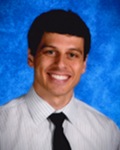Science Teacher
School of Education
December 1, 2011
“As a science teacher, my job is to create a community within the classroom that instills curiosity in young minds and encourages seeing the world through an imaginative and scientific lens.”
Academic mentors seem to play a consistently influential role in the lives of scientists. Sometimes through sustained instruction and sometimes through subtle and sporadic interactions, intellectual people develop the capabilities of those around them. This fact justifies and even defines the teacher’s role, especially in science. Scientific role models inspire others to focus their innate curiosity into a drive to ask legitimate questions and seek innovative answers. This ability is the true legacy of science and the ultimate responsibility of science teachers.
I am very fortunate to have been the student of a number of incredible scientific minds. If it had not been for my high school chemistry teacher, I probably would not have pursued an education in science. Mrs. Overman was the first person to clearly establish a link between the questions that I had concerning the world around me and the answers that science could provide. I even remember the exact question with which I approached her (and which she decisively answered) that originally allowed me to recognize how powerful and practical science could be. As a result, I spent the rest of that school year and years beyond challenging my curiosity to ask better questions, knowing that I could seek answers in science.
My undergraduate years studying chemistry at UC Berkeley immersed me in a rich environment with some of the most exceptional chemists in the world. For two years after that, my experience working for a Bay Area chemistry company gave me the opportunity to learn from industry professionals how to apply academic knowledge to the practical laboratory setting.
It was, however, my first enrollment at UC Irvine as a graduate student in chemistry that provided me with the academic mentors and colleagues who have taught me most about what the scientific mind truly is. Doing research for Dr. Alan Heyduk allowed me to work closely with an excellent scientist, learning how to recognize the questions that should be asked and to creatively design ways to answer them. Discussing ideas and issues with other students provided an atmosphere to further refine these skills that was memorably collaborative and taught me a great deal about the importance of generosity and open-mindedness in academic communities.
I am now thrilled to have assumed the role of science teacher. My job is to create the same type of community within the classroom, to instill curiosity in young minds, to encourage seeing the world through an imaginative and scientific lens. I was able to transition through UC Irvine from the Department of Chemistry to the Department of Education, from assistant teaching undergraduate chemistry courses to pursuing a single subject teaching credential in science and eventually to being hired as an intern teacher at Santiago High School in Garden Grove Unified School District. I continue to be surrounded by support from so many extraordinary people, including those in my UCI cohort, the science faculty and administration at Santiago, the district staff, my family, and especially my soon-to-be wife Carly.
Every day is more exciting than the one before. As the students begin to trust the enthusiasm and the encouragement coming from the front of the room, they begin to trust themselves and their own minds, their opinions, and their curiosities. It is exhilarating to be approached by students with inquisitive questions in the same way that I approached Mrs. Overman years ago. I know not every student will pursue an education in science to the extent that I did, but I believe that the skills I am teaching will serve my students in answering whatever questions they choose to ask throughout their lives. I could not ask for more.
